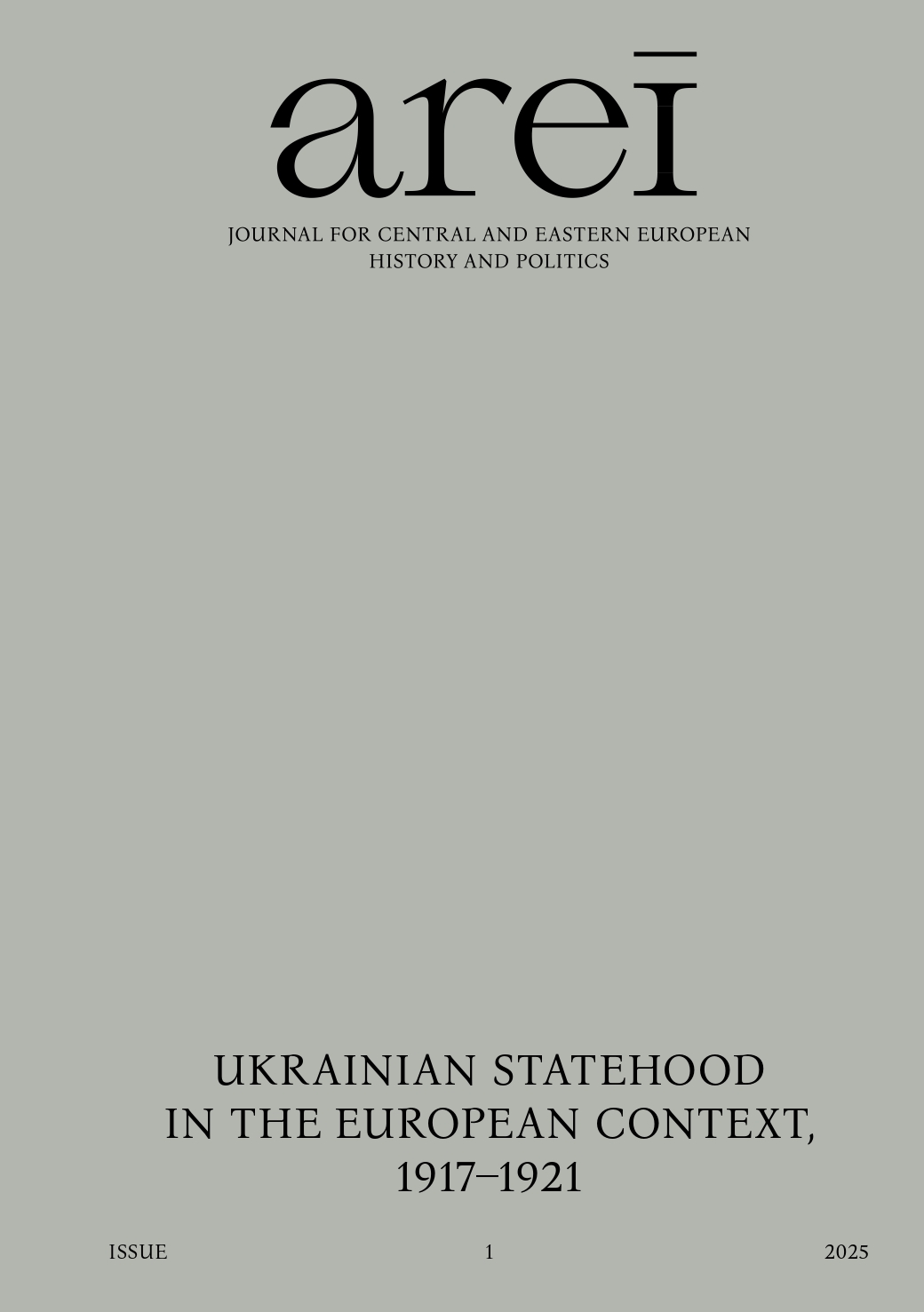PRINCIPLES OF PUBLICATION ETHICS AND REVIEW PROCEEDINGS
§ 1. AREI applies principles of publication ethics aimed at counteracting unfair publication practices, in particular in accordance with the guidelines of the Committee on Publication Ethics (COPE).
§ 2. The author or authors, when submitting an article for publication, shall:
1) certify its originality and the actual contribution of the author or authors to the article;
2) the main ideas and data given in the articles must be accurate and verified, when using the ideas and/or words of other authors, the rules of academic citation apply;
3) submit to the journal "AREI" texts that have not been published before;
4) declare that all persons who have significantly contributed to the scientific article have been disclosed as co-authors or co-editors, and that none of the disclosed authors or co-editors have been added for courtesy reasons;
5) the authors shall note the possibility of a conflict of interest that could affect the results of the research; if justified, they shall also submit information on the funding of the research that was the basis for the scientific article or other significant contributions from other institutions, associations or individuals.
§ 3. 1. The scientific article submitted for publication by AREI shall be referred for scientific review.
(2) The procedure for scientific review shall consist of two stages:
1) stage one, in which an internal review of the scientific article submitted for publication is carried out;
2) stage two, in which an external review of the scientific article submitted for publication is carried out.
§ 4. 1. Internal review is carried out by the AREI Editor-in-Chief and the Editorial Board Secretary, consulting other members of the editorial board if necessary. At the stage of internal review, it is checked whether the scientific article meets the condition of correctness of preparation in terms of methodology and workshop (thematic consistency, clarity and consistency of theses and conclusions, validity of research methods, correctness of the scientific apparatus, editing in accordance with the requirements of AREI) and the provisions on defamation, copyright infringement and plagiarism.
(2) The editor and members of the editorial board shall evaluate submitted manuscripts for their content, regardless of the race, gender, sexual orientation, religion, ethnicity, citizenship or political preference of their authors.
(3) The editor and members of the editorial board should not disclose information about submitted articles to anyone other than the authors themselves, reviewers and other editors.
4. ideas and data of submitted manuscripts may not be used in the editororf's own research and/or members of the editorial board without the written permission of the author.
5. For additional advice on the ethical aspects of the work of editors and editorial boards, see the COPE Code of Editorial Ethics and Good Editorial Practices. (https://publicationethics.org/files/Code_of_conduct_for_journal_editors_Mar11.pdf )
(6) An internal positive review is the basis for submitting a scientific article, in a form devoid of features that can identify the author without difficulty, to an external scientific review, which is entrusted to researchers whose scientific achievements and range of interests warrant a fair review. It is permissible to choose one of the reviewers from among the members of the AREI Council.
The external review should take into account both the above-mentioned criteria relevant to the internal review, as well as methodological correctness, factual accuracy or originality of the research and the degree of its contribution to the development of knowledge in the field of research.
(7) The reviewer may refuse to evaluate submitted materials if 1) he/she feels insufficiently qualified to evaluate the submitted research or 2) he/she is unable to evaluate the manuscript within a reasonable time.
(8) Each manuscript submitted for review is a confidential document. Manuscripts may be discussed only with persons who belong to the editorial board of the journal "AREI".
9 Reviews of a manuscript should strive for objectivity. Reviewers should justify their evaluations and avoid personal criticism.
10. the reviewer(s) should identify important publications that the author has not mentioned in the material. In addition, the reviewer is expected to point out significant similarities or overlaps or overlapping parts of the questioned manuscript with already published texts known to him/her.
(11) Information or ideas obtained during the review must be confidential and must not be used in the interest of the reviewers. Reviewers are expected to refrain from evaluating manuscripts for which there is a conflict of interest (as a result of competition, collaboration or other interested relationships with any authors or their institutions).
12. additional advice on ethical aspects of reviewers is available in the COPE Code of Ethics for Reviewers (http://publicationethics.org/files/Ethical_guidelines_for_peer_reviewers_0.pdf).
13.External review shall be made on the form of external scientific review, according to the model established by the Editor-in-Chief of AREI.
14. external review ends with the issuance of:
1) a request for admission of a scientific article for publication (positive external review); or.
2) a recommendation specifying the conditions necessary to be met before approving a scientific article for publication (external review positive with reservations); or
3) a request for rejection of a scientific article (external negative review).
§ 6. 1. The result of the scientific review, both internal and external, shall be notified to the author or authors of the scientific article.
(2) The Editor-in-Chief of AREI shall approve a scientific article for publication if it receives at least two external positive reviews.
(3) The AREI Editor-in-Chief may authorize the AREI Editorial Secretary or another member of the Editorial Board to perform the actions referred to in paragraph (2).
§ 7. (1) If a scientific article has not received at least two external positive reviews, and the content of the external reviews is contradictory, a super-reviewer may be appointed.
(2) The provisions of § 4.2-4.5 shall apply mutatis mutandis to the super-reviewer and the actions taken by him in the course of the external review of a scientific article.
(3) If in the case referred to in paragraph (1) a positive external review is made, it shall be the basis for approval of the scientific article for publication.
(4) If, in the case referred to in paragraph (1), an external positive review with reservations or an external negative review has been issued or a super-reviewer has not been appointed, the AREI Editor-in-Chief may approve the scientific article for publication after consultation with the Editorial Board.
§ 8. If a scientific article receives at least one external negative review, resubmission of the article is allowed provided that the recommendations made in the reviews are taken into account.
§. (9) In matters not regulated in this procedure, the following shall apply to the scientific review of a scientific article submitted for publication by AREI:
1) recommendations contained in the document "Good practices in review procedures in science", issued by the Ministry of Science and Higher Education in 2011;
2) the guidelines of the Committee on Publication Ethics (COPE – Committee on Publication Ethics).
POLICY ON THE USE OF GENERATIVE AI IN AREI SUBMISSIONS
The editorial board of AREI: Journal for Central and Eastern European History and Politics acknowledges the growing role of generative artificial intelligence (AI) in academic writing and research. To maintain transparency, scientific responsibility, and editorial integrity, we recommend the following policy for authors, reviewers, and editors:
1. Authorship and Accountability
AI tools (e.g., ChatGPT, Gemini, Claude) do not meet authorship criteria and must not be listed as authors. All listed authors must accept full responsibility for the integrity, accuracy, and originality of content produced using AI tools.
2. Use of AI in Manuscript Preparation
Authors may use generative AI tools to assist with:
- Language editing (e.g., grammar and clarity improvements),
- Formatting,
- Stylistic revisions.
Use of AI in this context does not require disclosure.
Authors may also use AI to generate preliminary ideas or conceptual prompts, but the resulting manuscript must be written and critically reviewed by the authors. Full responsibility for factual accuracy, citations, and scholarly interpretation remains with the author(s).
Use of AI for substantive generation of scientific content (e.g., generating full paragraphs of analysis or historical interpretation) is not recommended. If employed, it must be carefully reviewed and edited by the authors, and they remain fully accountable for all statements.
3. Disclosure Requirements
AREI does not require authors to disclose whether generative AI tools were used in preparing the manuscript, provided that:
- AI was not used to generate core scholarly arguments or primary data interpretation;
- No confidential or proprietary data were uploaded to external models;
- Authors accept full responsibility for all outputs.
However, authors may optionally provide a brief statement of AI usage in the acknowledgements or methods section for transparency.
4. Use of AI for Image Generation
AI-generated visual content (e.g., maps, figures) is not currently accepted unless:
- It is clearly labeled as AI-generated;
- The original dataset or prompt used to generate the image is provided;
- The image serves a purely illustrative (not evidentiary) purpose.
5. Use of AI in Peer Review
Peer reviewers must not use generative AI to:
- Summarize confidential manuscripts,
- Upload full or partial texts into public AI systems,
- Delegate review responsibilities.
Reviewers may, however, use AI tools to:
- Improve the clarity or structure of their comments,
- Check grammar or language.
Reviewers remain fully responsible for the intellectual and ethical integrity of their feedback.
6. Editorial Use of AI
The editorial team may use AI for non-confidential editorial tasks (e.g., formatting, grammar checks, correspondence templates), but will avoid using AI where sensitive author or reviewer data could be exposed.





